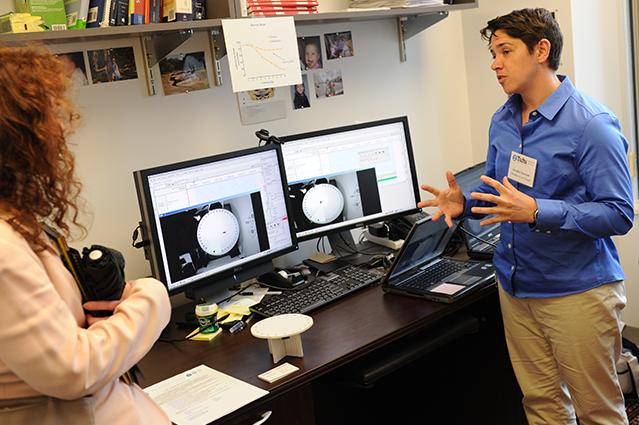CTS Master’s Program Facilitates Connections between Researchers and Clinicians

The basic science research that takes place in most GSBS labs allows scientists to gain a deeper understanding of the ways our bodies – and the diseases that threaten them – work. The GSBS Master’s Degree in Clinical and Translational Science, administered by the Tufts Clinical and Translational Science Research Institute, allows basic scientists to study and work with clinicians in order to build a bridge between discoveries at the bench and clinical interventions.
Rob Blanton, who received his Master’s in 2017, is a Cardiologist at Tufts Medical Center, an Associate Professor at the School of Medicine, and a GSBS faculty member. He says, “Starting with a clinical question is what, to me, is so interesting about translational medicine." His research focuses on understanding molecular signaling in the heart, and the ways in which that signaling goes awry and creates heart muscle weakening in response to stress. This research has clinical implications, as one pathway the lab focuses on, termed the cGMP-PKG pathway, is turned on in response to certain drugs that are used to treat high blood pressure and heart failure.
“The downside of these drugs is that, while turning on cGMP-PKGK signaling has benefits to heart muscle, this signaling pathway also dilates blood vessels and drops blood pressure,” Blanton said, “so a lot of patients can’t take them. What we’re trying to understand is whether there are parts of how PKG works that are specific to heart cells. The hope is that you could find a way to turn on PKG and help the heart while avoiding blood pressure lowering effects.”
Learning how to bridge basic science and clinical implications has fueled Blanton’s work, and helped fund it: the master’s thesis he wrote as part of the CTS program formed the basis for a successful research grant application. He credits the success of that grant to the translational approach he learned as part of the program.
“I got really great advice from David Kent [the CTS Program Director] and Karen Freund [KL2 Program Director and CTS faculty member] on how to explain my basic science research in such a way that someone in the clinical world could understand its clinical relevance,” he said.
For Jingui Dong, a 2017 graduate of the program, the appeal of the CTS master’s degree was the prospect of learning about the nuts and bolts of clinical trial design.
“Before joining the CTS program, I was working in clinical trials,” she said, “and the program is designed for people with either MDs or PhDs who need to learn about clinical trial design, which was exactly what I needed for my day-to-day work.”
For her CTS master’s, Dong – who has a PhD in Neuroscience – worked with Dr. Susan Parsons, whose research focuses on health disparities. Dong’s clinical research focused on identifying the barriers preventing underserved patients from accessing care, and coming up with ways to help those patients access healthcare resources.
“My starting population was breast cancer patients,” Dong said. “We looked at records from the Tufts Medical Center’s Cancer Center to find the reasons patients were unable to comply with the recommended treatment regimen, and then help remove those barriers so those patients could get better healthcare.”
Dong’s project had impressive results: in response to her findings, the Cancer Center instituted a patient navigation program to help improve patients’ experiences.
“I’m really proud to have been involved in this project,” she said.
Xi Qian, an August 2020 graduate of the program, also worked on clinical trials while completing his master’s. His research looked at outcomes for a new antibiotic used to treat C. diff, while also using the data to examine the association between the antibiotic treatment and patients’ gut microbiota.
Qian came into CTS having completed a PhD at the University of Vermont. He was working as a postdoc in the Molecular Microbiology program when he started his master’s, knowing he wanted to transition away from basic science and into clinical research. He now works at BioPeer, a contracted research organization that helps with data analysis, management, and reporting for clinical trials.
“I gained a lot of experience in clinical trial design and statistics,” Qian said. “I also got very practical experience; I did an internship with the Biostatistics, Epidemiology, and Research Design (BERD) Center, which is under CTSI.”
Like Blanton and Dong, Qian found the CTS master’s to be a rewarding experience, one that really helped him in the next phase of his career.
“My favorite thing about the program was its flexibility, and the way it provided those practical opportunities,” Qian said. “Whatever you’re interested in, the program will help you reach out: to a professor, a company, or a hospital. They will establish the relationship for you, and you might be able to do a practicum with them. It’s a really personalized experience, and that’s what helped me.”